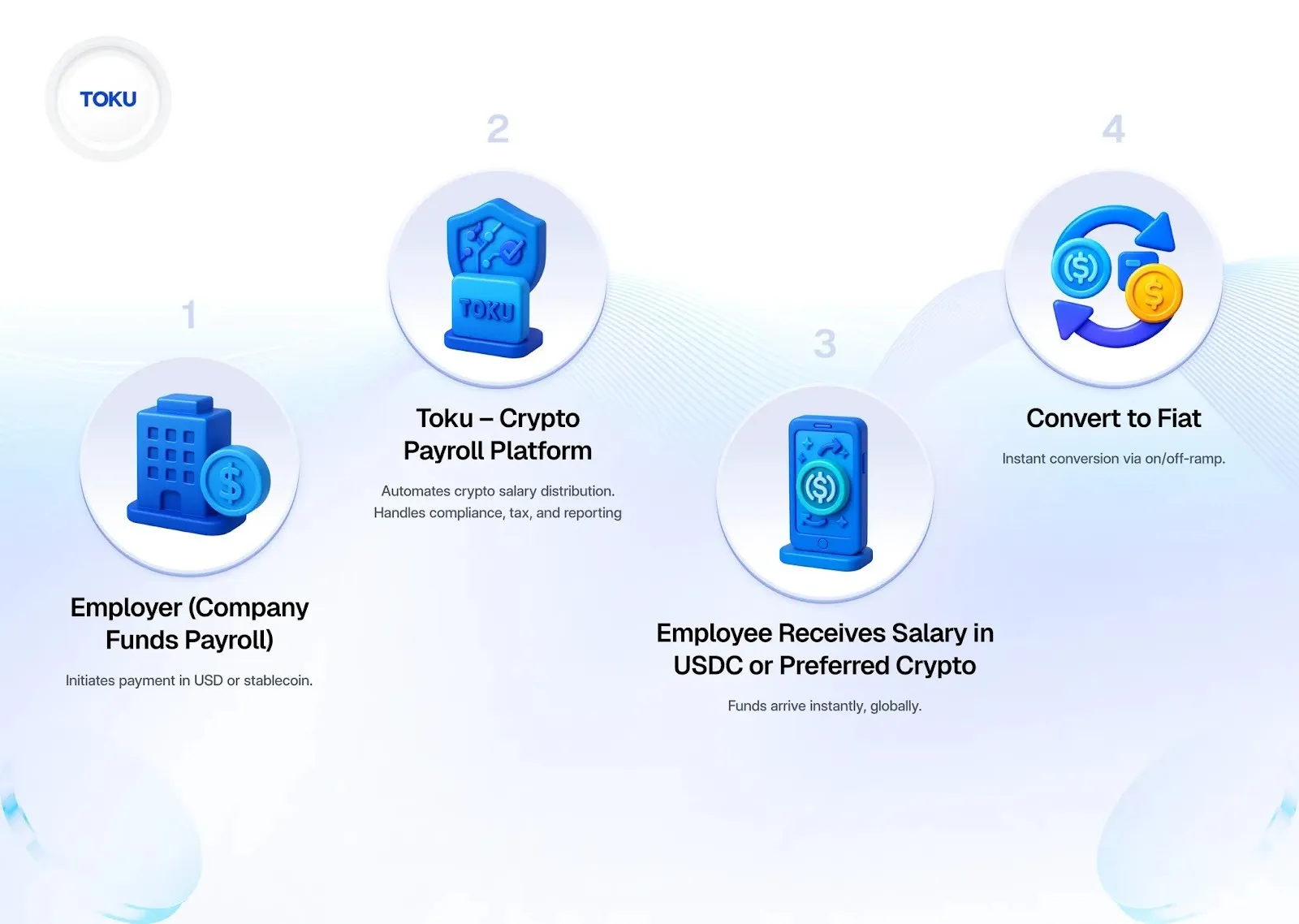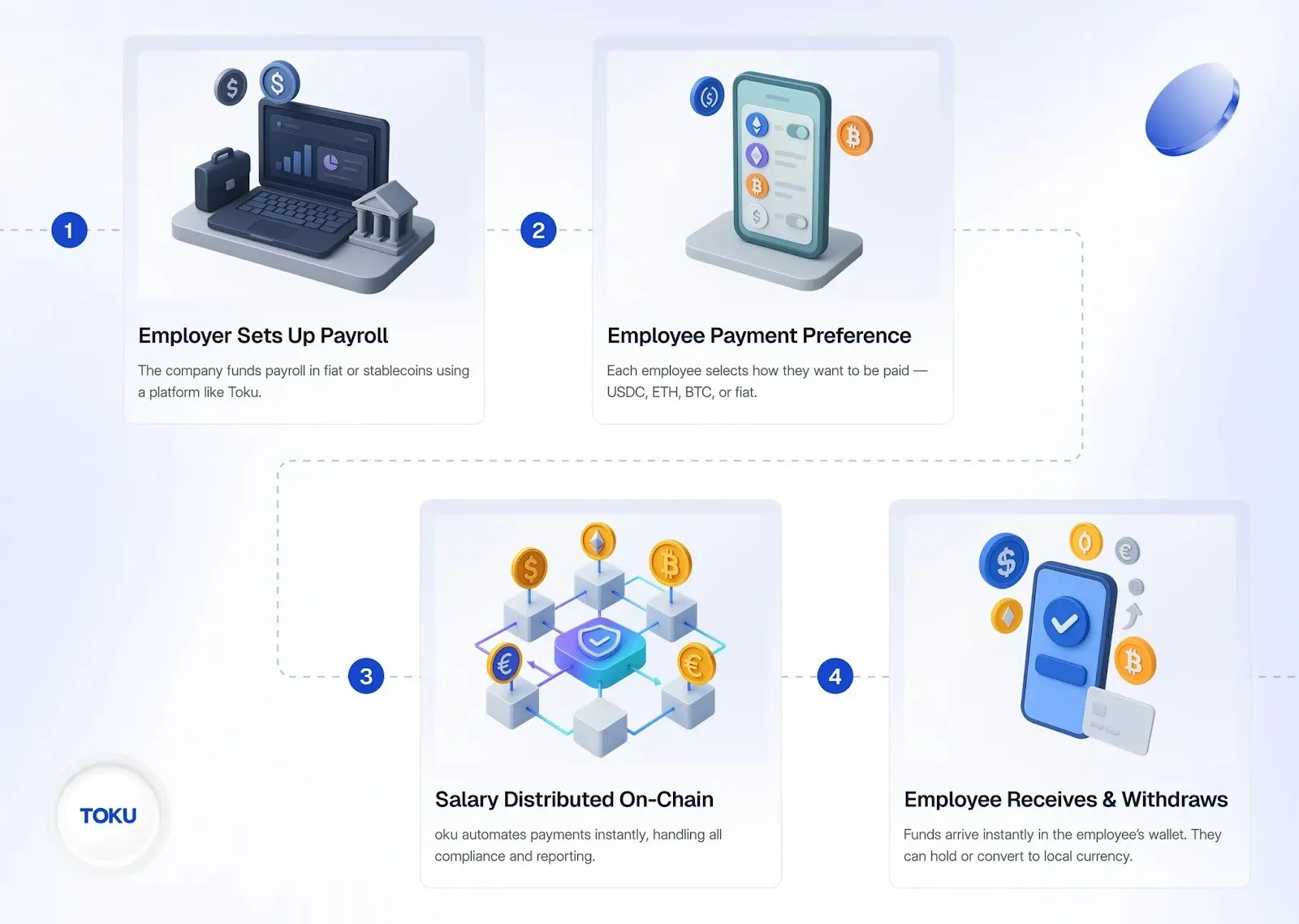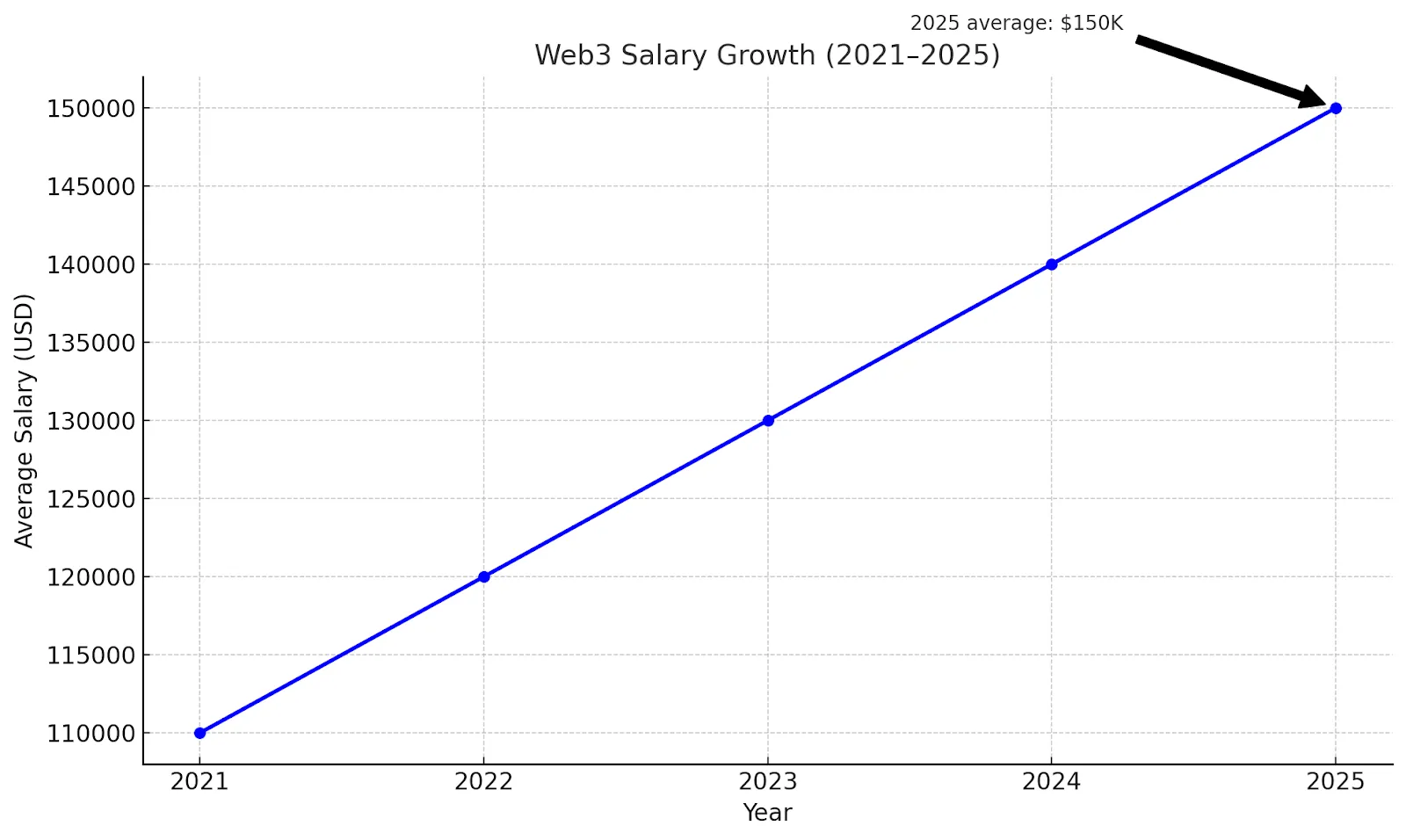
Crypto Salaries Explained: How Companies Pay Teams in Digital Assets (Safely & Compliantly)
Discover how crypto salaries work, from USDC payroll to legal compliance. Learn how companies safely pay global teams in digital assets.

.avif)
In 2025, it’s not just early adopters or DAO contributors getting paid in digital assets. Companies from fintech startups to global dev teams are offering crypto salaries - where part or all of an employee’s compensation is paid in stablecoins (like USDC) or tokens (like ETH or BTC), instead of traditional fiat.
It’s not a gimmick. It’s a shift.
Quick context:
The average global Web3/blockchain developer salary is now around $150,000, based on recent job board data. More than 40% of these roles offer some form of crypto compensation, typically denominated in stablecoins like USDC - not volatile tokens.
Why? Because:
- Crypto payrolls are faster and cheaper than international wires
- They work across borders without banks
- And they help attract top remote and Web3-native talent
But crypto payroll isn’t as simple as “send coins and call it a day.”
Regulatory compliance, tax reporting, and employee choice matter - especially if you’re operating globally.
That’s where Toku comes in. Toku helps companies offer crypto salaries legally, instantly, and at scale, handling:
- KYC/AML checks
- Country-specific tax rules
- Automated USDC payouts
- Fiat conversion options
In this guide, we’ll break down:
- What crypto salaries actually are (and how they work)
- Why companies are using them in 2025
- Compliance and tax considerations
- Stablecoins vs tokens for payroll
- Salary trends, risks, and real use cases
Let’s dive in.
What Are Crypto Salaries (and How Do They Work)?
Crypto salaries refer to compensating employees or contractors using digital assets - either fully or partially. This can include:
- Stablecoins like USDC or USDT (pegged to fiat currency)
- Cryptocurrencies like Bitcoin (BTC) or Ethereum (ETH)
- Project tokens (e.g. governance or incentive tokens issued by the employer)
Some companies offer 100% of a salary in crypto. More commonly, crypto is offered as an optional payout method or as a portion of total comp - with the rest in fiat.
Here’s what a typical crypto salary process looks like:
Crypto Payroll: How It Works Step-by-Step
- Employer Funds Payroll Wallet: The company loads funds into a treasury or custodial wallet - in fiat, USDC, or another supported asset.
- Crypto Payroll Platform (e.g. Toku) Executes Distribution: On payday, the platform automatically calculates the correct amount, applies conversion logic (if needed), and routes payments based on employee preferences.
- Employee Receives Salary in Wallet of Choice: The funds are delivered to the recipient’s crypto wallet (Metamask, Coinbase Wallet, etc.), or converted to fiat and deposited via local payout partners.
- Tax & Compliance Reporting Handled in Background: Platforms like Toku generate localized payslips, handle withholding (if required), and keep a full audit trail for accounting and legal purposes.
Crypto Salary Workflow
Compliance, tax logic, and KYC checks occur automatically within the platform.

Unlike a basic wallet transfer, crypto salaries need to account for:
- Employment classification (FTE vs contractor)
- Local tax laws
- Currency preferences
- Sanctions and AML screening
Toku simplifies this by acting as the operational layer between a company’s HR/finance systems and global blockchain rails - so teams get paid how they want, and compliance is handled behind the scenes.
Why Companies Are Offering Crypto Salaries
Crypto salaries aren’t just a Web3 fad - they’re a practical solution to modern compensation challenges. Remote-first teams, global contractors, and distributed DAOs are rewriting how work gets done. Payroll is evolving to keep up.
Here’s why more companies are choosing to offer crypto-based compensation in 2025:
Global Teams, Fewer Borders
Traditional international payroll is expensive, slow, and full of friction. Wire transfers can take days, trigger unnecessary fees, or get stuck due to intermediary banks.
Crypto changes that. With stablecoins like USDC, payments can:
- Settle in minutes
- Bypass currency conversion fees
- Reach contributors in underbanked regions with just a wallet
Example: A startup based in the U.S. can pay developers in Nigeria or designers in Argentina using USDC - no bank required.
Lower Fees, Faster Settlement
When you pay in crypto, you're not paying:
- Bank wire fees
- FX markup fees
- Intermediary clearing fees
You're just sending value directly to the recipient - often with network fees under $0.01 (especially on blockchains like Polygon or Solana). That means more of your payroll budget goes to your team, not to middlemen.
Attracting Top Web3 Talent
In crypto-native industries, top contributors expect the option to be paid in digital assets.
- Developers want to get paid in USDC or ETH
- DAOs pay contributors in governance tokens
- Some execs negotiate partial comp in project tokens for upside
Offering crypto salaries signals that your company is forward-thinking - and gives you an edge in competitive hiring.
Real-World Example: How Privy Used Toku to Pay Global Contributors with Stablecoins
When Privy - a data privacy infrastructure company for web3 - needed to pay a distributed team of contributors, they ran into the usual challenges: banking delays, high international wire fees, and complexity converting currencies across borders.
Instead of setting up a patchwork of bank accounts and tools, Privy turned to Toku.
- Toku enabled instant, compliant stablecoin payments to contributors in 5+ countries
- Privy’s team received payments in their preferred wallets - no delays, no middlemen
- Toku handled the heavy lifting: KYC, tax forms, and reporting - so Privy didn’t have to
By paying contributors in USDC, Privy reduced costs, sped up settlement, and offered contributors a better experience than traditional payroll ever could.
Why it matters:
This isn’t just about crypto for crypto’s sake - it’s about making payroll faster, fairer, and more flexible for modern, global teams. Toku made it easy.
How Employees Get Paid in Crypto: Step-by-Step Overview
From onboarding to payday, here’s what receiving a crypto salary actually looks like
For many employees, “getting paid in crypto” still feels vague or intimidating. But in reality, the process is often simpler than traditional payroll - especially when you're using a modern platform like Toku that handles compliance, conversions, and taxes behind the scenes.
Here’s how it typically works, step by step:
Step 1: The Company Sets Up Crypto Payroll
The employer partners with a compliant crypto payroll platform like Toku to manage salaries, taxes, and global regulations. This can run alongside traditional payroll systems or fully replace them for crypto-native teams.
- Employers fund their payroll account in fiat or stablecoins (e.g., USDC).
- The system manages distribution, withholding, and reporting.
Step 2: Employees Choose Their Preferred Payout Method
Each employee (or contractor) selects how they want to be paid:
- 100% in fiat
- 100% in crypto (e.g., USDC, BTC, ETH)
- A custom split (e.g., 70% fiat / 30% USDC)
This flexibility is key - especially for international workers who prefer stablecoins due to speed and cost savings.
Step 3: The Platform Executes and Settles the Payment
On payday, the platform:
- Automatically converts the salary into the selected currency
- Sends the funds directly to the employee’s registered wallet or bank account
- Triggers compliance checks (e.g., AML, KYC) as needed per jurisdiction
Stablecoin payments like USDC typically settle in seconds - no waiting days for wires to clear.
Step 4: Employees Receive, Hold, or Convert Their Crypto
Once the payment hits their wallet, employees can:
- Hold it in crypto (especially if they’re paid in USDC or ETH)
- Convert it to fiat using an exchange or off-ramp service
- Spend it directly via crypto cards or merchant platforms
Some platforms also offer auto-conversion into fiat if workers prefer not to hold crypto at all.
The 4 Steps of Receiving a Crypto Salary

Legal and Tax Considerations for Crypto Salaries
Compliance isn’t optional. It’s the key to sustainability.
Getting paid in crypto might sound like the future, and it is, but it still needs to happen under the rules of the present. Companies offering crypto salaries have to navigate a maze of tax codes, labor laws, and cross-border regulations. The good news? It’s doable. The better news? Toku handles most of it for you.
Let’s break down what you need to know.
Crypto Salary Legality Depends on Where You Are
Not every country treats crypto the same way. In the U.S., for example, the Fair Labor Standards Act allows non-cash compensation as long as employees are paid at least minimum wage in fiat. That means many employers choose a hybrid setup: base salary in dollars, bonus or equity in crypto.
In the EU, countries like Germany and Portugal have clear tax treatment and payroll paths for crypto wages. But other regions - particularly parts of Asia and the Middle East - may have restrictions, unclear guidance, or bans.
Key rule: Always check local laws. Just because a wallet can receive USDC doesn’t mean it’s compliant to use it for salaries.
Legal Status of Crypto Salaries by Region
Regulation varies by jurisdiction - some require fiat base pay, others support crypto as full compensation. Toku’s compliance engine helps companies stay on the right side of local laws in 25+ countries.
Regulatory data informed by Toku’s Country Explorer, which maintains real-time compliance coverage across 25+ countries
Tax reporting: not just your problem - theirs too
In most jurisdictions, crypto is treated as property, not currency. That means companies and employees may both have reporting obligations. Here’s where it gets complex:
- Employers must calculate fair market value at the time of payment
- Employees may owe income tax on received crypto, plus capital gains when they sell or convert
- Tax forms vary by country, and most require conversion into local fiat value
This is why companies using crypto payroll can’t just send coins and call it a day - every transaction needs a paper trail.
Toku’s compliance engine keeps teams out of trouble
Toku makes it possible to pay in USDC, BTC, or ETH while staying above board. Here’s how:
- Automatic tax withholding and filings
- Built-in KYC/AML checks for global compliance
- Geographic enforcement to avoid sanctioned jurisdictions
- SOC 2–certified infrastructure for data security
Whether you're a U.S. C-corp hiring a dev in Argentina or a DAO contributor in Portugal, Toku ensures every crypto payment meets the local requirements - without you needing a team of lawyers.
Stablecoins vs. Tokens: Which Are Better for Salaries?
Not all crypto is created equal - and when it comes to payroll, stability wins every time.
Why Stablecoins Like USDC Are Payroll-Ready
If you're paying employees in crypto, you want predictability. You want the payment to be worth the same today as it is tomorrow. That’s where stablecoins come in.
Stablecoins like USDC (USD Coin) or USDT (Tether) are pegged to the value of a fiat currency (usually the U.S. dollar). They're designed for everyday transactions - not speculation.
Here’s why they work so well for salaries:
- Low volatility - 1 USDC = 1 USD (no surprise value drops)
- Simpler tax treatment - more like fiat than crypto tokens
- Global accessibility - anyone with a wallet can receive it
- Backed and audited - USDC is issued by a regulated entity (Circle), with monthly attestations
By contrast, crypto tokens like ETH or BTC can swing wildly in price - making it tough for employers to budget and for employees to plan their finances.
Stablecoins vs. Tokens for Payroll
This is why Toku enables USDC payroll globally, giving teams the best of both worlds: the speed and flexibility of crypto, with the stability and clarity of fiat.
Crypto Salary Trends in 2025
Crypto salaries are no longer a novelty - they’re a strategic advantage. As more companies build global-first teams and talent becomes harder to retain, offering part or full compensation in crypto is becoming a core lever in modern compensation packages.
Web3 Salary Benchmarks (2025)
Based on recent aggregates from job boards like CryptocurrencyJobs.co, CryptoJobsList, and Web3 Jobs, here’s what we’re seeing:
- Average global Web3 salary: approximately $150,000/year
- Blockchain developer salaries: often range from $120K to $200K+, depending on stack and seniority
- Remote roles now make up 80%+ of listings on Web3 job boards
- 20–40% of roles now offer partial or full crypto compensation, often with USDC as the default
Web3 Salary Growth (2021–2025)”

Line chart showing the growth of average global Web3 developer salaries from 2021 to 2025. Salaries rise from approximately $110,000 in 2021 to $150,000 in 2025, based on data from CryptoJobsList, Web3.career, and CryptocurrencyJobs.co.
What’s Driving the Trend?
- Borderless hiring is the new normal: Companies want the best talent, regardless of where they live. Paying in crypto - especially stablecoins - removes the friction of international wires and banking delays.
- Stablecoin payroll makes compensation faster and fairer: Contractors and employees receive the full value of their pay without currency conversion fees, especially in emerging markets.
- Crypto-savvy candidates expect it: Web3-native developers, product leads, and marketers often prefer to be paid in USDC or a mix of stablecoins and tokens. It signals alignment with the ecosystem.
If 2021–2023 was about experimentation, 2025 is about optimization.Teams are streamlining crypto salaries for speed, cost, and global talent retention - and USDC is at the center of that shift.
Risks and Challenges of Crypto Salaries
It’s not all upside - here’s what to watch out for (and how smart teams avoid the pitfalls).
Crypto salaries come with massive potential, but they’re not risk-free. If you’re planning to pay (or be paid) in digital assets, it’s important to understand the common challenges - and how companies like Toku help mitigate them.
1. Volatility Can Undermine Payroll Predictability
Bitcoin and Ethereum can swing 5–10% in a day. That means if a developer agrees to a $5,000 salary in ETH on Monday, it might only be worth $4,500 by payday Friday. Not exactly a stable paycheck.
Toku solution:
Most teams use stablecoins like USDC to eliminate volatility. Toku supports multi-currency payrolls, allowing contributors to lock in value and still get paid instantly in crypto.
2. Tax Complexity Across Jurisdictions
In many countries, crypto is taxed as property - not currency. That means employees may trigger capital gains taxes just by receiving or converting crypto. Employers also face obligations for withholding, reporting, and fair market value documentation.
Toku solution:
Toku automates tax calculations, withholding, and reporting - across 100+ jurisdictions. You stay compliant while employees get clarity on their tax obligations.
3. Security and Fraud Risks
Unlike a lost debit card, there’s no customer support hotline for a mistyped wallet address or hacked private key. If funds go to the wrong place, they’re gone. Permanently.
Toku solution:
Toku’s platform enforces SOC 2–certified security and identity verification. No sketchy wallets. No manual processes. Just secure, automated payouts every time.
4. Regulatory Uncertainty in Some Countries
Some jurisdictions require a base salary in fiat, with crypto allowed only as a bonus. Others ban crypto compensation altogether. Regulations shift fast - and ignorance isn’t a defense.
Toku solution:
Toku helps you navigate global crypto payroll legally - using its built-in EOR (Employer of Record) and compliance layer. You don’t need to hire lawyers in every country just to stay legal.
5. Limited Infrastructure Without the Right Tools
DIY crypto payroll may seem simple - until you try reconciling wallets, tracking FMV, generating reports, or scaling across borders.
Toku solution:
Toku is built specifically for compliant crypto payroll at scale. You get APIs, dashboards, compliance tools, and integrations - no spreadsheets required.
Crypto salaries aren’t plug-and-play - but with the right partner, they’re no more complex than fiat. Toku handles the hard stuff, so teams can focus on growth, not legal guesswork.
How Toku Makes Crypto Salaries Simple and Compliant
The missing piece between global payroll and blockchain compensation
Let’s be honest: paying employees in crypto sounds futuristic - until you try to actually do it.
That’s when the friction kicks in:
- Legal uncertainty across countries
- Tax headaches for every transaction
- Security concerns with wallets and smart contracts
- No clean integration with your HRIS or finance systems
That’s why companies turn to Toku.
Toku is the infrastructure layer for compliant crypto compensation. We don’t just help you send payments - we help you do it legally, safely, and at scale.
What Toku Handles for You
Toku’s platform abstracts away the complexity of crypto-native payroll so you can focus on building your business. Here's what you get:
- Global coverage in 100+ countries (via EOR/PEO or direct contractor support)
- Stablecoin-native (USDC, USDT) and token payroll distribution
- KYC, AML, and sanctions screening baked in
- Automated tax withholding and reporting for both employees and contractors
- SOC 2–certified infrastructure with full audit logs
- Custom vesting schedules for token grants and compensation
- Integration with your HR tools, custody providers, and finance systems
You don’t need to become a compliance expert. You just need to choose how you want to pay, and Toku takes care of the rest.
Why Finance and HR Teams Choose Toku
- Set up once, scale globally
- Compliant from day one - no patchwork fixes later
- Easy employee experience - choose payout method and get paid instantly
- Peace of mind for CFOs and Legal teams
Astar Network pays 80+ contributors in USDC across 25+ countries using Toku’s infrastructure - without touching their internal payroll stack. Read full case study →
FAQs About Crypto Salaries
Still have questions? We’ve got answers.
Is it legal to pay employees in crypto?
Yes - in many countries, it’s legal to pay employees or contractors in crypto, as long as minimum wage, tax withholding, and employee consent rules are followed. In the U.S., for example, the Department of Labor allows stablecoin wages if employees voluntarily consent and are paid at or above fair market value.
See country-specific rules in the Toku Country Explorer
How are crypto salaries taxed?
In most countries, crypto is taxed as property or digital assets. This means:
- Companies must report payments as income
- Employees/contractors may need to report gains/losses upon conversion
- Tax withholding or filing may be required at the source
Toku automates this with local tax rules built into the platform.
Do employees choose which currency they get paid in?
Yes, most crypto payroll platforms (including Toku) allow recipients to choose between:
- Stablecoins like USDC or USDT
- Native tokens (for token grants or bonuses)
- Fiat payout via conversion
Some companies pay in a mix (e.g., 80% fiat, 20% USDC).
Can I pay contractors and full-time employees in crypto?
Yes.
- Contractors: Typically easier, crypto is treated as a form of invoice payment.
- Full-time employees: Requires more care, some countries require base salary in fiat, with crypto as a bonus or supplement. Toku’s EOR model ensures full legal coverage either way.
What happens if the price of crypto drops?
That’s why most companies use stablecoins like USDC.
If you pay someone $1,000 USDC, they receive exactly $1,000 in value - with no volatility risk. Using BTC or ETH requires extra planning due to price swings.
The Future of Salaries Is On-Chain
Blockchain payroll isn’t a trend - it’s the next evolution of compensation.
Web3 isn’t just transforming how we build products - it’s transforming how we pay people.
Crypto salaries give companies and teams:
- Global freedom - hire anywhere, no bank needed
- Instant payments - no 3-day delays or wire fees
- Transparent compensation - fully auditable and secure
- Compliant infrastructure - if you use the right tools
But compliance is non-negotiable. That’s why forward-thinking companies are turning to trusted platforms like Toku - not just to send crypto, but to do it safely, legally, and globally.
If you're ready to streamline global crypto compensation - and never worry about tax, legal, or operational risks again...
Try Toku.
Your global team deserves payroll that moves at Web3 speed.







